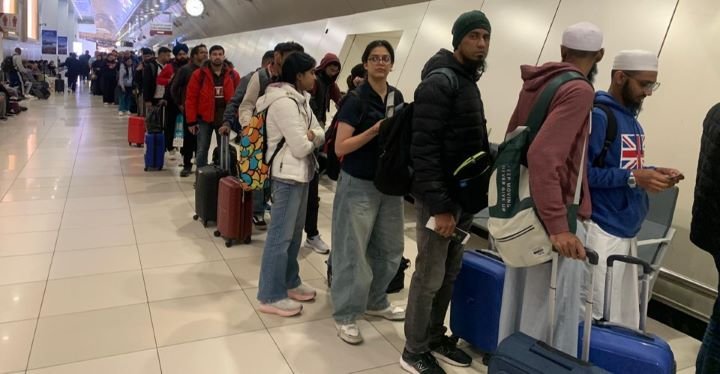Indian Passengers Stranded in Kuwait Allege Harassment After Emergency Landing
An emergency landing by a Gulf Air flight has left Indian passengers stranded in Kuwait at the airport for over 19 hours, sparking allegations of discrimination and inadequate support. The ordeal, following an engine fire incident, highlights the challenges faced by passengers from non-Western countries during unforeseen travel disruptions.
Gulf Air flight to Manchester finally departed at 0434 hours today carrying stranded Indian passengers among others. Embassy team was on the ground till the flight departed. pic.twitter.com/47GVer4Bs4
— India in Kuwait (@indembkwt) December 2, 2024
The Gulf Air flight, en route from Mumbai to Manchester via Bahrain, was forced to make an emergency landing in Kuwait after passengers noticed smoke and fire emanating from one of the engines. The flight’s diversion was announced just 20 minutes before landing, leaving passengers anxious and unprepared for the prolonged ordeal ahead.
Upon landing, passengers expected swift assistance. However, they reported being left in limbo, with many sitting on the terminal floor for hours due to a lack of adequate facilities. The disruption was compounded by the ongoing GCC Summit in Kuwait, which limited hotel availability and left travelers stranded inside the airport.
Embassy @indembkwt had immediately taken up the matter with Gulf Air in Kuwait. A team from Embassy is at the airport to assist the passengers and coordinate with the airline. Passengers have been accommodated in 2 airport lounges. pic.twitter.com/1OySe3KGLc
— India in Kuwait (@indembkwt) December 1, 2024
Allegations of Bias Against Indian Passport Holders
Passengers alleged discriminatory treatment by the airline and airport authorities, claiming that priority accommodations were offered only to those holding passports from the European Union, the UK, or the US. Indian and other South Asian travelers, they said, were denied basic amenities like food, water, and lounge access for several hours.
The passengers, frustrated by the lack of assistance, raised concerns about being treated as “non-entitled” travelers. The absence of visa-on-arrival privileges for Indian passport holders in Kuwait further complicated the situation, as they could not exit the airport to access external accommodations.
Indian Embassy Steps In
Amid growing frustrations, the Indian embassy in Kuwait intervened to assist the stranded passengers. Embassy representatives coordinated with Gulf Air and local authorities, eventually securing lounge access for the affected individuals. However, efforts to arrange hotel accommodations were hampered by the GCC Summit, which had already strained local resources.
The embassy’s on-ground team worked until the rescheduled flight to Manchester finally departed at 4:34 am the following day. Despite their efforts, the incident underscored the logistical and diplomatic challenges of managing such crises for non-Western travelers.
Frustration Among Passengers
For many passengers, the ordeal was more than an inconvenience—it was a harrowing experience. Travelers recounted running behind airport staff for hours, seeking answers and assistance. The lack of clear communication and basic necessities like food and water added to their distress, with some passengers expressing fears of being stranded indefinitely.
The disruption caused professional and personal inconveniences for passengers, many of whom had commitments waiting for them in the UK. The prolonged wait and inadequate support left a lasting impression on those involved.
The incident sheds light on the systemic disparities in the treatment of passengers based on nationality and visa status. While Western travelers often benefit from more lenient visa policies and proactive support, those from South Asia face additional hurdles during travel disruptions.
This episode also raises questions about the responsibilities of airlines during emergencies. From ensuring fair treatment of all passengers to providing timely assistance and clear communication, incidents like this highlight areas where improvements are necessary.
The ordeal faced by Indian passengers in Kuwait underscores the need for better preparedness and equitable treatment in the aviation sector. Airlines must prioritize transparency, timely assistance, and unbiased support to ensure the well-being of all passengers, regardless of nationality.
The Indian government and airlines can also work together to advocate for stronger protections and rights for Indian travelers, particularly in regions where visa restrictions limit mobility during emergencies.
See Also:
Indian Student in Chicago Shot Dead
Arrest of 2nd Hindu Priest in Bangladesh Raises Alarms
Social Media Ban for Under-16s in Australia
US Universities Advise International Students to Return Before Trump’s Inauguration
China Discovers Massive Gold Reserve Worth ₹7 Lakh Crore
——————————————————————————-
It would mean the world to us if you follow us on Twitter, Instagram and Facebook. At Newscazt, we strive to bring you the latest news and stories from India, World, Business, Sports, Entertainment and more. Our team of experienced journalists and writers are committed to delivering accurate and unbiased news and analysis.




